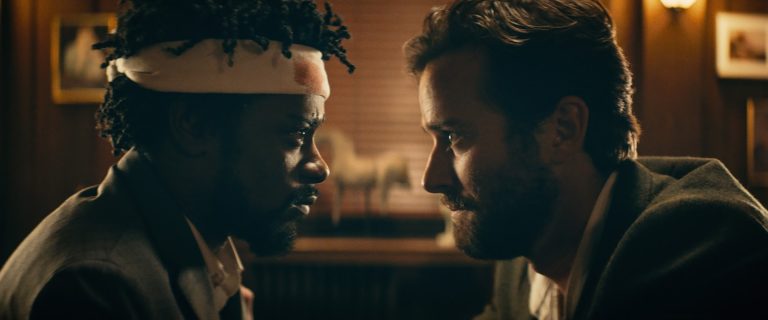Editor’s Note: Well, isn’t this is embarrassing? In the midst of tweaking my year-end rankings I was revisiting SIFF reviews and only now noticed that this last installment of short reviews was never published. For posterity then, a flashback to some hits and misses of SIFF 2018.
First Reformed (dir: Paul Schrader, USA | 2017 | 113 minutes)
I was fully onboard for so much of Paul Schrader’s portrait of a lonely, depressed priest whose encounter with a radical environmental parishioner spurs a crisis of faith. Ethan Hawke is indeed exceptional as a wounded man whose retreat from tragedy brought him to a second life of faith, tending to a tiny flock and the historical chapel that functions primarily as a tourist spot for a local megachurch. As the film opens, he has just adding a side of introspective journaling to his nightly whiskey and Pepto cocktail, giving us access to his increasingly conflicted thoughts. Thus, we are privy to the intellectual invigoration and spiritual conflict are stirred when he begins counseling a parishioner with some legitimate anxieties (but extreme solutions) about bringing a child into the impending human-created climate nightmare. He describes these sessions, a distraction from his usual mundane chores and weary preparations for the church’s reconsecrations, “exhilarating … like wrestling with an angel.” As much as I was along for the ride that ensues from there – a wild one that includes a bizarro junkyard funeral set to a children’s choir rendition of a Neil Young protest song and only gets weirder from there – it all comes to a head in a final series of scene that erased my admiration for everything that preceded it and left me questioning exactly what a film needs to do to earn a spiritual breakdown. Regardless, the reverend’s nightcap of choice will remain one of the Most 2018 cocktails of the year. (☆☆☆)
Disobedience (dir: Sebastian Lelio, United Kingdom | 2017 | 114 minutes)
Sebastián Lelio directs two fantastic Rachels (McAdams and Weisz) in a drama of culturally-constrained love in Orthodox London. We get only a brief glimpse into her free-wheeling life in NYC as a photographer before Weisz’s Ronit returns home after a long absence in the wake of her rabbi father’s untimely demise. The transition into this pious, Frumworld is jarring, and little is immediately explained. Answers answers to questions large and small are revealed in their own deliberate time. The acting and pacing of this film, the immersion into an enclave in which everyone knows each other’s business, and its handling of emotional and religious conflicts are so expertly handled that I’m surprised by how much the previews reveals. Early in the film, Ronit is surprised to find that her childhood best friends (one of whom was her father’s protégé) have married, for reasons that the trailer gives away far more quickly that the film does. (☆☆☆☆)
The Children Act (dir: Richard Eyre, United Kingdom | 2017 | 105 minutes)
We meet a no-nonsense Emma Thompson dispatching the Queen’s Justice over grave matters from on high. Her work deciding deeply complex legal issues consumes her life, leaving little time for her husband (Stanley Tucci) or patience for his declaration that he’s decided to have an affair to supplement what’s missing from their marital bed. Coupled with this betrayal, Fionn Whitehead (Dunkirk) enters by way of another impossible case, adding another role as a persistent, resourceful wide-eyed youth to his IMDB page as the kid who drastically upsets her keen sense of balance.(☆☆☆½)
Thunder Road(dir: Jim Cummings, USA | 2018 | 90 minutes)
An out-of-control eulogy (complete with a soundtrack-free interpretive dance, probably a clever workaround for not having the rights to the Springsteen title track) is just the beginning of roller-coaster of tumultuous emotions, a few breakdowns, and some hilarious real feels for a North Carolina police officer as he deals with the death of his mother, custody of his daughter, a toxic relationship with his ex-wife, and the effect of all of this on his job on the force.It’s a cliche to say “you’ll laugh, you’ll cry”, but it’s rare for those to happen so often at the same time in one movie. Jim Cummings’s viruouso performance in a film that he also wrote and directed fits that bill. (☆☆☆☆)
Beast (dir: Michael Pearce, United Kingdom | 2017 | 107 minutes)
I can’t say it better than a friend who gave it two stars because it was (1) beautifully shot and (2) a movie. Props to the Jersey tourist board for getting so much scenic footage in front of audiences, but as for the rest of the plot: what a muddle. (☆☆)
Let the Sunshine In (dir: Claire Denis, France | 2017 | 94 minutes)
How do you say “romantic comedy” en Français? Juliette Binoche, playing a divorced Parisian, drifts through a series of romances and lovers, some more suitable than others, to varying success. A multidimensional performance captured through Claire Denis’s capable direction, be sure to stay through the end credits for some of the film’s biggest actual laughs. (☆☆☆½)
Racer and the Jailbird (dir: Michael R. Roskam, Belgium | 2017 | 130 minutes)
Perhaps unsurprisingly, this multi-national co-production feels like group project gone horribly awry. Opening scenes at the racetrack promise a sexy romance between a beautiful rich driver (Adèle Exarchopoulos, our racer) and a handsome rogue with a secret penchant for robberies (Matthias Schoenaerts, the jailbird). Of course, eventually a heist goes wrong and the jig is up. But not for the movie. Instead, it swerves into increasingly melodramatic, often nonsensical, territory — from jailhouse romance to maudlin disease — incoherently gesturing in search of a big idea while mercilessly stretching the running time. One main takeaway: the French prison system and its early release program are extremely generous, but can be quickly undone by a chance encounter with small yappy dog. (☆☆½)
Boundaries (dir: Shana Feste, USA | 2018 | 104 minutes)
I always leave blandly OK movies like BOUNDARIES wondering why “such good people” like Vera Farmiga & Christopher Plummer are in them. It’s really hard to believe that something with such great acting from the always-wonderful pair could fall so horribly flat, but Boundariesremains at the bottom of the pile for me. She’s a co-dependent single mother with an awkward son and a Seattle home overflowing with Instagram-ready rescue pets; he’s her scoundrel father who gets kicked out of his retirement community for dealing marijuana. Somehow, he cons her into a weeklong roadtrip that jeopardizes her apparently plush job planning parties for rich people so that he can make one last score. From the illicit drug trade to an artistic kid not being able to fit in anywhere in Seattle, not a single note rings true. In the end, it seems like everyone involved gave up and writes off the many substantial conflicts as miraculously resolved, which I suppose was the film’s only small mercy in terms of the running time. (☆☆)
Blindspotting (dir: Carlos Lopez Estrada, USA | 2018 | 95 minutes)
As Blindspotting opens, our hero (Daveed Diggs) is three days away from completing his year of probation and horrified to be in a car comedically brimming with his friends’ loose guns. His childhood best friend – a white guy with gold grills who spits rhymes in the streets and bemoans the changing face of Oakland is none too pleased to find that a recently re-opened neighborhood burger joint is now “vegan by default”. While rushing back to his court-mandated halfway house by curfew, Diggs witnesses a police shooting at a traffic crossing, but keeps silent out and spends the rest of the film haunted by a series of waking nightmares. Meanwhile, their job with a local moving company provides a clever entry into a series of vignettes that exemplify the gentrification sweeping the city (artists being priced out, unsentimental house flippers profiting vicariously on run down homes). Oh, and there’s also jokes about the green juice epidemic, kids learning about the best ways to avoid getting shot by the cops, tacky techbro parties gone bad, and a screaming fight in the street about the N-word and white fragility. There are certainly a lot of good points in here and it’s clearly a long-gestating labor of love. But the movie is so overstuffed with ideas and in a hurry to make all of its trenchant points about inequity that no one stopped it from racing into an unintentionally embarrassing, fully outlandish conclusion that involves extreme coincidence and an extended confrontation conducted entirely in rap. I could barely watch, but others may have a more generous take on fantasy elements and musical moments. (☆☆½)
Sorry to Bother You (dir: Boots Riley, USA | 2018 | 120 minutes)
The future of late-stage capitalism has never looked more absurd, hilarious, and terrifying. Lakeith Stanfield climbs out of a dead end life in his cousin’s garage by scaling the ranks of a telemarketing empire with the help of a “white voice” played by David Cross. His artist/activist girlfriend (Tessa Thompson), keeps it real with intense installations and the best statement earrings of the year. Armie Hammer is delightful as a corporate conman whose insane house party features more surprises than just an unforgettably hilarious and incendiary open mic performance. Where Blindspottingwent off the rails in all the wrong cringeworthy ways (for me), Boots Riley’s hallucinatory vision of the Bay Area in capitalist crisis and worker revolt started weird, gets wilder, and then launches into the stratosphere of searing social commentary. (☆☆☆☆½)
Relive SIFF via all of our coverage on our SIFF 2018 page including interviews, pro-tips, roundtables, and reviews from the country’s biggest, longest, most-attended little film festival.




